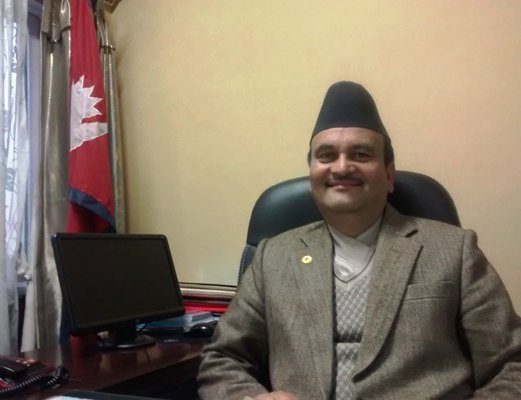
As you are leading the civil service as the chief secretary at a very crucial period of Nepalese history, what is the significance of the Immediate Reform Action Plan?
On day one, when I took charge as the chief secretary, I held a meeting with the secretaries. After consultations, I provided them with a frame to prepare the Reform Action Plan. The Office of the Prime Minister and Council of Minister received large volumes of raw types of preliminary drafts from various ministries. We fine-tuned all these preliminary drafts and finally prepared the current Immediate Reform Action Plan for a two-year period.
How did the idea of the Immediate Reform Action Plan come up?
It was in my mind even before assuming the office. As the country has been passing through a transitional period, there is the need of reforms to make it more efficient and effective in delivering the service.
What are the major components of the Immediate Reform Action Plan?
The plan includes four main components. One is transitional management. Following the promulgation of the new constitution, there is the need of making the civil service organizations, laws and regulations compatible with the new constitution. Each institution should have to fine tune its organization. This also includes civil servants management. The second is to give priority to reconstruction and support and coordinate with the National Reconstruction Authority. The third is to make service delivery effective and efficient at the frontline. This includes providing solar as alternative energy, subsidizing electricity tariff to supply of drinking water. In education sector, the immediate action plan suggests to develop minimum criteria for head master, school management committee and teacher to evaluate their working performance by developing criteria. The fourth component includes development management. We developed the Immediate Reform Action Plan on that basis. Each Ministry has submitted its draft with its own plan of actions.
We did this because the idea is the ministries feel their ownership of a plan generated by them. As the duration of the reform plan is two years, I am hopeful about being able to implement it. I have distributed the summary of our Immediate Reform Action Plan to Nepal’s development partners. There is a mission on the plan. So far as the implementation is concerned, the plan stands on the four pillars. Some ministries have already started its implementation. I believe that all ministries will implement them.
There are also reports that you have not defended the civil servants and did not say anything when the ministries were split. How do you look at this?
It is not that I have not defended the civil service and civil servants. There are limitations of the Chief Secretary, as he can push for political decisions only for a few days arguing the pros and cons, but he cannot make or avert them. I held the decision to split the ministries for almost one and a half months, arguing that splitting the ministries can destabilize bureaucracy. I do have the knowledge of what the administrative reform commissions have been suggesting since 1954 till now. I briefed the political leadership on all the recommendations and constitutional provisions. I have my own way of working. Before the decision is taken, I can argue and debate about it, but I can’t go against the decision. After the cabinet took the decision, my role changed as an implementer.
Why were you unable to pursue your position on these issues?
In our country, the culture is that professionalism cannot change political determination. It is a fact that my opinion does not prevail. I have made strong efforts. When the political leadership showed their political compulsion, I could not prevent the splitting of the ministry.
What changes have you made in the civil service?
I have taken some decisions which were not taken in the last one decade. For instance, I have developed the criteria for the transfer of secretaries and postings following promotion. My criteria of posting are based on seniority. Even in my batch, I was posted to the Additional Division whereas my colleague was posted at the Ministry of Information. At least, I am making efforts to establish a system.
Some of former bureaucrats are criticizing that you, as the chief secretary, did not take a stand during the splitting of the ministry. How do you look at this?
I can claim that no chief secretary can prevent the implementation of political will. Persuade, I did. I have not seen any chief secretary making a u-turn on the political determination. Since I have been in the civil service for the last 35 years, I have seen several chief secretaries. In the last 13 years, I have been closely involved in cabinet decisions. I worked in the cabinet in different capacities. In that sense what I can say is all the chief secretaries try to persuade the political leadership till they are in the mood to listen. Once politicians express their determination, the chief secretary can do little to prevent the decision. I cannot go to media against any decision.
How is the civil service moving in the context of current transitional period? How capable are the Nepalese civil servants?
Following the promulgation of the new constitution, the country has entered into a new phase and new situation. As Nepal is in a transition, the situation demands civil service to be compatible to the changed context. Civil servants and civil service are capable enough to handle all kinds of situations. If politicians allow civil servants to work independently, they can deliver better results. Futuristic approach and professional ideas are getting less importance than resolving critical political situation that politicians feel when and as required.
How do you see the prospects of working in the federal structure?
On the basis of my academic background and past experiences, what I can claim is that I have a fairly good comparative advantage in designing federalism. I have mentioned to you that before designing and structuring the federal system, there is the need to have a political roadmap. According to a political roadmap, we can design administrative technicalities. We need to have professional autonomy to fit in administrative technicalities within the political roadmap. We can do all the work in case of autonomy in political design.
How do you look at the transitional management?
Transition is the management of all kinds of uncertainties. For the management of transition, the political leadership must work on the basis of national statesmanship. It is easy for civil servants to work if the political leadership guides them on the basis of national statesmanship. You can design federalism in any situation but it will create another transition at the functional stage. I have been saying that the political transition is over following the promulgation of the constitution. However, the real technical transition has only started. For this all ministries, institutions and politicians, civil society and activists, all of them, need to work as per the spirit of the constitution, thinking more professionally and responsibly.
How are you working to change the administrative structure?
As I mentioned, there is the Immediate Reform Action Plan that has clearly spelled out the structures and functions. All the ministries have expressed their commitment to work accordingly. Ministry of General Administration is doing certain studies on the administrative restructuring. Some consultants are working in the Ministry of General Administration in this regard.
What is hampering the progress now?
First of all politicians should decide on important issues like demarcation of provinces, choose the areas for provincial capitals, the number of districts, the manpower and so on. Without coming to grips with all these issues from the political level, planning the federal design is no more than throwing stones in the dark. Although the constitution has already been promulgated, political consensus is required to implement it. As long as there is the lack of consensus on implementation, our design might not be perfect. So far as civil servants like me are concerned, nobody needs to take any doubt about our capability and commitment in our work. The only question is whether there is a political ownership or not in the work we can design.
As Nepal’s development partners, including the Asian Development Bank and the World Bank have been expressing disappointment on Nepal’s performance in capital spending, how do you look at this?
Frankly speaking, there is a lack of conducive working environment in the frontline. Our average capacity of spending capital expenditure has been declining. We have also issued some directions. We have introduced project performance agreement with the project chiefs. Nepal needs to increase its capacity to make progress. Some of their concern is genuine. We have been taking certain initiatives. However, we have also a tendency to raise the weakness and not to recognize the strength. There must be a conducive political environment to accelerate the development projects and bureaucracy alone cannot change the situation drastically. Despite such a situation, the bureaucracy has been performing its work within its limitations. Our foreign aid absorbing capacity has been weak for a long time. If we look at the foreign aid since 1990, we find the price overrun, cost overrun, time overrun and frequent variations. This is a tragic legacy. Going through the legacy, we are unable to increase our capacity. It is not only bureaucracy but also a process, lack of resources as the commitment, gap in technical capacity. Once the political environment changes, the situation will also improve.
What is the state of implementation of the projects now?
Just a few days ago I interacted with the heads of the government offices in Dhangadhi. I found that the development projects are not going well. First and foremost problem right now is the fuel crisis. Along with the fuel crisis, there is also a tendency to shift the responsibility. I have been often raising this issue in all the regular secretary meetings. As the decision of the cabinet, I have already directed the Ministry of Supply and Nepal Oil Corporation to provide the fuel to the national priority projects like irrigation, hydropower and roads. The supply situation has gradually improved .

Keshab Poudel
Poudel is the editor of New Spotlight Magazine.
- ETFC Nepal is focused on expanding distribution and transmission to the private sector: ETFC Chair Dr. Dhital
- Jul 05, 2025
- FOURTH PROFESSOR Y.N. KHANAL LECTURE: Nepal-China Relations
- Jun 23, 2025
- Colonel JP CROSS: Centenary Birthday
- Jun 23, 2025
- REEEP-GREEN: Empowering Communities with MEP
- Jun 16, 2025
- BEEN: Retrofitted For Green
- May 28, 2025















